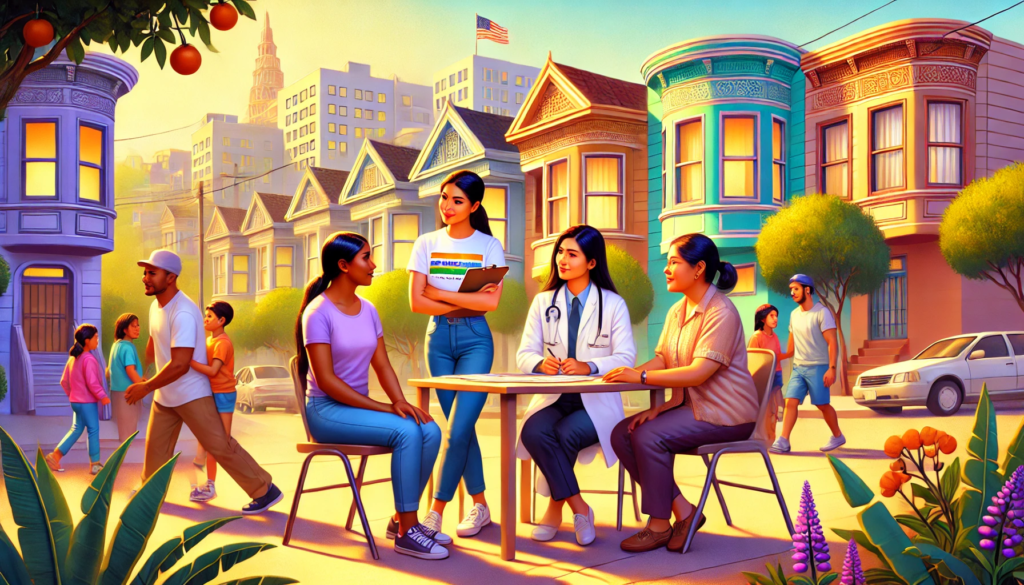Housing instability is a worldwide problem, impacting one-fifth of all people on Earth. Latino communities in the United States are disproportionately vulnerable to this threat, particularly in California where Latinos make up 40 percent of the population, according to the 2022 American Community Survey.

A cooperative in San Francisco, California, called Promotoras Activas SF (PASF) is doing its part to help mitigate that crisis. This team of promotoras—female community outreach activists working in Latino neighborhoods—has assisted more than 2,000 families in filing housing applications and more than 700 households in applying for rental assistance, thus preventing eviction. PASF also helps provide food, health care, and other essential resources to those in need.
Some of the founders of this cooperative began laying the groundwork for PASF in 2017. They helped the city’s Latino communities apply for affordable living spaces under San Francisco’s housing lottery program.
Since then, these promotoras have gradually broadened the scope of their civic engagement to include community health work and education. Much of PASF’s work consists of door-to-door outreach in parts of San Francisco with large Latino populations, including the Mission, Bayview, and Tenderloin districts. Additionally, its workers—about 20 in total—disseminate information pertinent to Latino communities in family resource centers, schools, and churches.
Building Better Lives
Blanca Trujillo, a member of the PASF team since 2022, says this cooperative consists of “mothers [like her] who came from different countries to work hard, to [build] better lives for ourselves, our families, and our kids than we had in our countries [of origin].” She explains that some PASF workers immigrated to the United States “to escape from extreme poverty [and] lack of opportunities. They came looking for a safe place from rape [and] from violence.” She adds, “I can’t say what I ran away from because it’s very sad.”
Like many promotoras, Trujillo has experienced the same challenges as the people she supports. Because she speaks their language, recipients of her services trust her with information they don’t feel comfortable sharing with other individuals and organizations.
“When I work with Latino families, they tell me, ‘You are like me; you are going to understand me,’” she notes. “People identify with us because [we] understand the culture. [We are] part of them. They feel safe.”
The History of Promotoras
Rooted in methods used in 1920s South Africa and 1930s China, the promotoras model emerged in 1950s Latin America, where female community outreach workers educated women in underserved areas about reproductive health. In the 1960s, promotoras mobilized in the United States through a government-initiated support campaign to improve health care access for marginalized populations. Those efforts began in Texas and on the West Coast, where female outreach workers provided information on reproductive and general health, as well as specific ailments endemic among Hispanic and Latino communities.
As migrant workers entered the country in growing numbers, this model began circulating more widely throughout the United States in the late 1980s, particularly during the escalating AIDS/HIV crisis when organizations started using promotras programs more widely in states like California. Planned Parenthood’s implementation of the promotoras system in the 1990s further popularized this style of community outreach, which is now used in every U.S. state.
Battling the Pandemic
Following in the footsteps of earlier promotoras, PASF entered the public health sphere during the COVID-19 pandemic. To combat the magnified threat that the virus posed to Latino people, the team provided contact tracing services and case investigation work.
When the COVID-19 vaccines became available, PASF’s promotoras arranged vaccination appointments and worked to raise awareness about the vaccine. According to a 2022 article in the San Fransico Chronicle, “[i]n San Francisco, 89 percent of Latinos now have at least two vaccine doses, one of the highest vaccination rates among ethnic groups in the city,” stated Christopher Gil from the nonprofit Mission Economic Development Agency, which helped develop Promotoras Activas SF. “That helped us to stop the spread [of the virus] in San Francisco’s Latino community,” Trujillo states.
Additionally, PASF worked with the University of California San Francisco and the Department of Public Health to establish quarantine periods for those infected with COVID-19, connect those individuals with hotels where they could quarantine, help people recovering from the virus recoup income they lost while quarantining, and follow up on diabetic patients who got sick.
With the pandemic exacerbating preexisting income challenges, PASF maintained its longstanding practice of aiding Latino community members in applying for rental assistance, filing housing applications, and navigating the complicated world of tenant rights. It also helped provide individuals and families with food, supplies, and access to health care.
Galvanized by its success in alleviating suffering and decreasing the spread of COVID-19, PASF became a worker-owned cooperative in 2021. It continues to bring relief to San Francisco’s Latino population through medical assistance and housing and connecting them to social services.
Trujillo says no amount of money can match the feeling she gets from helping people in need. “I am rich,” she states. “Even though I don’t have money, I am happy and rich. I have a grateful heart.”
AUTHOR BIO: Damon Orion is a writer, journalist, musician, artist, and teacher in Santa Cruz, California. His work has appeared in Revolver, Guitar World, Spirituality + Health, Classic Rock, High Times, and other publications. Read more of his work at DamonOrion.com.
This article was produced by Local Peace Economy.
